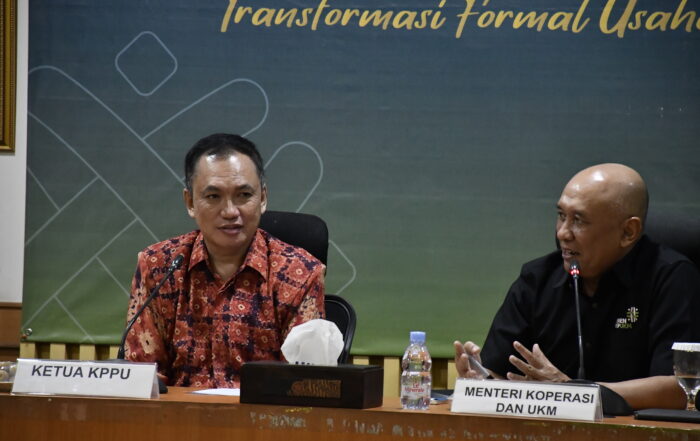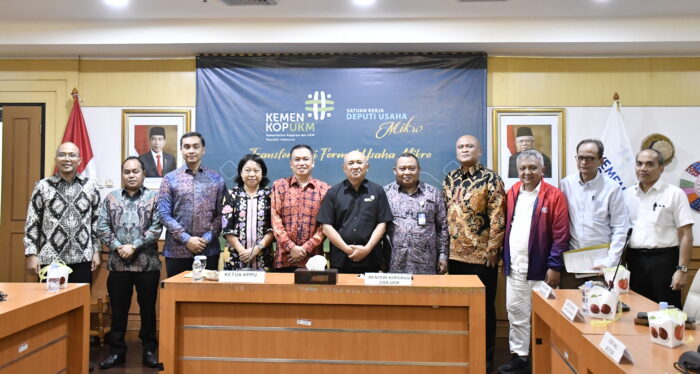ICC Chairperson Offers Four Strategies To Minister Of Cooperation and Small and Medium Enterprises For Effective Oversight of Indonesia’s MSME Partnerships.

Jakarta (19/2) – Indonesia needs regulations that protect micro, small, and medium enterprises (MSMEs) in transactions in the digital market, synergy or integration in partnership data collection, increased deterrent effects for partnership violators, and increased education for MSME players. These conclusions were emphasized by the Chairperson of the Indonesia Competition Commission (ICC), M. Fanshurullah Asa, in a meeting with the Minister of Cooperatives and SMEs, Teten Masduki, held today at the Ministry of Cooperatives and SMEs Office in Jakarta. The four strategies above are in line with the government’s priorities to encourage the number of MSME partnerships, the use of digital platforms by MSMEs in transactions, and increase the digitization of government services.
In the meeting, which was also attended by ICC members Budi Joyo Santoso, Moh. Reza, Eugenia Mardanugraha, Gopprera Panggabean, and Hilman Pujana, the ICC Chairperson underlined the importance of improving and protecting MSME partnerships. He explained that MSMEs play an important role in the national economy. With 64.2 million in number, MSMEs are able to contribute to 61% of Indonesia’s gross domestic product, with a value of Rp8,573.89 trillion. MSMEs are also able to absorb 97% of the total workforce and attract up to 60% of total investment in Indonesia. For this reason, it is important for the government to develop the competitiveness of MSMEs in the domestic and global markets through partnerships.
The Chairperson of the ICC also noted that the management of MSME partnerships is in the hands of various ministries and institutions, and provincial governments, in accordance with their duties and authorities. The management is more directed at increasing the number of partnered MSMEs, especially access to capital and markets. Currently, of the target of 11% of MSMEs having established partnerships by 2024, only 7% have been realized. This means that strategies are needed for acceleration and increased synergy between ministries and institutions to achieve this target.
There are 4 (four) strategies put forward by the Chairperson of the ICC, namely making regulations that protect MSMEs in transactions in the digital market, integrating partnership data collection, increasing the deterrent effect for partnership violators, and increasing education for MSMEs related to partnerships.
The ICC considers that one of the ways to improve the competitiveness of MSMEs in domestic and global markets is to use access to technology. From the target of 50% (or 32.1 million) of Indonesian MSMEs to have gone digital by 2024, around 24.8 million MSMEs have gone digital. This year, it is projected to reach 30 million MSMEs. With the increasing use of technology, there is an increasing need for MSMEs to be protected in the digital market. For this reason, according to the Chairperson of the ICC, a regulation or legislation is needed that is able to protect MSMEs in marketing their products in the digital market.

“This regulation is needed to prevent monopolistic practices, data abuse, and abuse of dominant positions by platform owners. Various countries have adopted this, such as Europe, South Korea, and Thailand. Indonesia should have similar regulations to protect our MSMEs from competing in the digital market,” explained the Chairperson of the ICC.
The protection of MSMEs in the digital market is also very important when viewed in terms of data protection, because MSME products are vulnerable to imitation. Moreover, only 11% of Indonesian MSMEs until 2023 have registered their intellectual property products. Therefore, the Chairperson of KPPU encouraged the Minister of Cooperatives and SMEs to accelerate regulations or laws to protect MSMEs in the digital market.
“Legislation, such as laws or, in the early stages, ministerial regulations to protect MSME players in the digital market, should be accelerated,” said the Chairperson of the ICC.
The second strategy is the need for data collection on partnerships as part of the integration of the business licensing system. Currently, there are only around 5.8% of MSMEs that have a business identification number. This condition will complicate the supervision of partnerships, especially since there is no recording or data collection on partnerships made by MSMEs. For this reason, the ICC is of the opinion that, in addition to integrating the business licensing system for MSMEs, the government also needs to collect data on partnerships as part of the integration of the business licensing system so that partnership supervision runs more effectively.
The ICC Chairperson also highlighted that over the past five years, only 55 partnership issues have been handled by the ICC, mostly relating to core plasma partnerships. There are still many potential partnership violations that may occur. With the limited resources of the ICC, more assertive efforts are needed for partnership violations in order to create a deterrent effect for violating business actors. However, the amount of fines set by Government Regulation No. 17 of 2013 is still very low, which is a maximum of IDR 5 billion for medium-sized businesses or IDR 10 billion for large businesses. Therefore, as the third strategy, KPPU considers that there is a need to revise the government regulation on the sanction article.
As the fourth strategy, ICC believes that prevention efforts through education and assistance to MSMEs on the implementation of partnerships also need to be improved. One way is to introduce the profession of partnership extension workers, who will go to the field to educate MSMEs in implementing their partnerships, both in terms of legality and education on partnership principles as well as the rights and obligations of business actors in partnerships.
During the meeting, the Minister of Cooperatives and SMEs agreed with the ICC’s views, especially on the digital market aspect and improving the quality of partnerships. For this reason, the Minister of Cooperatives and SMEs proposed that the ICC synergy in the future be directed at electronic commerce, supervision of partnerships in government spending, supervision of partnership portion commitments in the palm oil sector, data collection synergy, and improving the quality of partnerships so that partnerships made are not just charity from large business actors.
Both parties believe that the protection of MSMEs, quality partnerships, and the effectiveness of partnership implementation can run simultaneously so as to have a positive impact on strengthening the fundamentals of the national economy.






